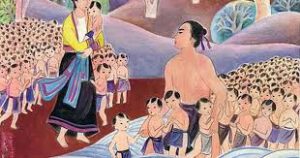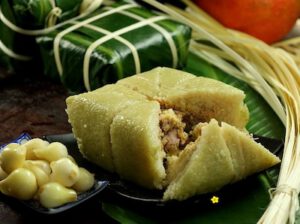Nhân ngày Giỗ Tổ Hùng Vương (Mùng 10 tháng 3 Âm Lịch), hãy cùng thầy Bình đọc một số thông tin liên quan đến ngày Lễ quan trọng này, sau đó cùng nhau áp dụng vào bài Speaking – “Describe a festival that is important in your country” nhé.
READING PASSAGE:
Celebrating the Hung King Festival in Vietnam: A Tribute to the Nation’s Ancestors
In Vietnam, the Hung King Festival, known locally as “Giỗ Tổ Hùng Vương,” stands as a poignant reminder of the country’s ancient history and cultural heritage. Held annually on the 10th day of the third lunar month, the festival honors the Hung Kings, revered as the founding fathers of the Vietnamese nation. This public holiday encapsulates a blend of national pride and traditional reverence, drawing participants from across the nation to engage in age-old ceremonies and festive activities.
Origins and Historical Significance
The Hung King Festival traces its roots back to the Hong Bang period (2879-258 BC), when the Hung Kings founded and ruled Vietnam. Legend has it that these kings were descendants of the Dragon Lord Lac Long Quan and the Fairy Au Co. They are credited with establishing the country and laying down its initial social, cultural, and political foundations. Every year, millions of Vietnamese pay homage to these mythic figures, expressing gratitude for their contributions to the nation’s early development.

Celebrations Across the Country
The focal point of the festival is the Hung Temple, located on Nghia Linh Mountain in Phu Tho Province. Here, the main ceremonies are conducted with a grandeur that matches the deep historical and spiritual significance of the occasion. The rituals begin with a flower ceremony known as “Chuc Xuan,” followed by processions, incense offerings, and recitations of prayers dedicated to the Hung Kings.
Across Vietnam, cities and villages immerse themselves in the festive spirit. Streets are decorated with vibrant flags and banners. Traditional music fills the air, accompanied by drumbeats. Theatrical performances, including reenactments of historical events associated with the Hung Kings and lion dances, provide entertainment to the masses.
Culinary Delights
A distinctive aspect of the Hung King Festival is the array of traditional foods prepared and enjoyed communally. Among the most significant dishes is “Banh Chung” (square sticky rice cake), which symbolizes the Earth, and “Banh Day” (round sticky rice cake), representing the sky. These cakes are made from simple ingredients—glutinous rice, mung beans, and pork—yet carry profound cultural meanings. Families gather to prepare these dishes, often turning the process into a festive activity unto itself.

A Unifying Force
For modern Vietnam, the Hung King Festival is more than just a historical commemoration; it serves as a unifying force, fostering national pride and solidarity. It reminds the Vietnamese people of their shared ancestry and cultural heritage, strengthening community bonds.
Moreover, the festival has gained recognition beyond Vietnam’s borders. It serves as a cultural ambassador, introducing the world to Vietnamese traditions and history through diaspora communities worldwide.
Conclusion
The Hung King Festival embodies the spirit of Vietnam, bridging the past with the present, the mythical with the historical. It’s a day of profound importance to the Vietnamese people, offering a moment to reflect on their roots and celebrate the enduring spirit of their nation. Through its compelling blend of ritual, cuisine, and community, the festival not only commemorates a pivotal chapter in Vietnam’s history but also strengthens the fabric of its society today.
IELTS SPEAKING FULL TASK:
Part 1: Introduction and Interview (4-5 minutes)
Topic: Festivals and Public Holidays
- What is your favorite festival or public holiday? Why do you like it?
- How do you usually celebrate this holiday?
- Are there any special foods associated with this festival?
- Do you think festivals are important for a society? Why or why not?
Part 2: Long Turn (3-4 minutes)
Topic: Describe a festival that is important in your country.
You should say:
- What the festival is
- When it is celebrated
- What people do during this festival
And explain why this festival is important in your country.
Part 3: Discussion (4-5 minutes)
Topic: Cultural Significance of Festivals and Public Holidays
- How have festivals changed in your country in recent years?
- Do you think public holidays contribute to the economy of a country? How?
- Should public holidays be standardized globally or should they remain unique to each culture?
- What role do you think festivals and public holidays will play in the future society?
SAMPLE ANSWERS:
Part 1: Introduction and Interview
- What is your favorite festival or public holiday? Why do you like it?
“My favorite festival is the Hung King Festival in Vietnam. I like it because it connects me deeply with my country’s history and mythology. It celebrates the Hung Kings, who are considered the founding fathers of Vietnam. The festival is not only a time for reverence but also a celebration of our national identity and cultural heritage.” - How do you usually celebrate this holiday?
“The Hung King Festival is typically celebrated with various traditional ceremonies and family gatherings. My family and I usually start the day by visiting the local temple to pay our respects and offer incense. Later, we gather with extended family to share a meal that includes traditional foods like ‘Banh Chung’ and ‘Banh Day,’ which are significant to the festival.” - Are there any special foods associated with this festival?
“Yes, special foods associated with the Hung King Festival include ‘Banh Chung,’ which is a square sticky rice cake, and ‘Banh Day,’ a round sticky rice cake. These cakes are made from glutinous rice, mung beans, and pork, and they symbolize the Earth and the sky, respectively. These foods are not only delicious but also laden with symbolic meanings.” - Do you think festivals are important for a society? Why or why not?
“I believe festivals are crucial for a society because they reinforce cultural and historical knowledge and foster a sense of unity among people. For instance, the Hung King Festival is a time when Vietnamese from all walks of life, irrespective of their differences, come together to honor our ancestral kings and celebrate our heritage. This strengthens community bonds and reaffirms our cultural values.”
Part 2: Long Turn
Describe a festival that is important in your country.
The festival I’m going to talk about is the Hung King Festival, which is a very important festival in Vietnam. We celebrate it on the 10th day of the third lunar month every year. This usually falls in April according to the international calendar.
During the Hung King Festival, many people, including my family and friends, go to temples to show respect to the Hung Kings, who were the first leaders of Vietnam. People also bring offerings like food, especially traditional cakes called ‘Banh Chung’ and ‘Banh Day.’ These cakes are made of rice and have a lot of meaning in our culture. In addition to visiting temples, there are big parades, music, and dance performances. Everyone feels very happy and proud during this festival.
The Hung King Festival is important in Vietnam because it helps us remember our history and the first kings who made our country. It is a time when we feel proud of our past and our culture. It brings people together as we all celebrate the same history. This festival teaches us about respect, gratitude, and unity, which are very important values in our Vietnamese community. It’s a special day for all of us to celebrate and remember where we came from.
Part 3: Discussion
- How have festivals changed in your country in recent years?
“In recent years, the Hung King Festival, like many other traditional festivals, has seen changes, particularly in how it’s celebrated by the younger generations. There’s been a noticeable increase in commercial activities around the festival, and modern elements have been integrated into the celebrations. However, the core traditions such as offering incense and preparing traditional foods have remained intact.” - Do you think public holidays contribute to the economy of a country? How?
“Public holidays like the Hung King Festival significantly contribute to the economy, primarily through tourism and retail. Tourists flock to historical sites, boosting local businesses and hospitality services. Additionally, there’s a spike in sales of traditional goods and foods, which supports small businesses and promotes cultural industries.” - Should public holidays be standardized globally or should they remain unique to each culture?
“Public holidays should remain unique to each culture because they reflect the historical and cultural idiosyncrasies of a society. Standardizing them globally would diminish their significance and the cultural diversity they represent. For example, the Hung King Festival is specific to Vietnam and tells the story of our national origins, which wouldn’t necessarily hold meaning for other cultures.” - What role do you think festivals and public holidays will play in future society?
“In future societies, festivals and public holidays will continue to play a vital role in maintaining cultural heritage and bringing people together. Despite the rapid changes in our globalized world, these celebrations can offer a sense of continuity and identity. Particularly for the younger generations, festivals like the Hung King Festival will provide an opportunity to connect with their heritage and learn about their history in an increasingly digital and interconnected world.”
KEY VOCABULARY
- Festival – A celebration or event that is usually centered around a specific theme or occasion.
- Vietnamese: Lễ hội
- Ancestors – People from whom one is descended, especially those more distant than grandparents.
- Vietnamese: Tổ tiên
- Reverence – Deep respect for someone or something.
- Vietnamese: Sự tôn kính
- Ceremonies – Formal acts or sets of acts prescribed by ritual, protocol, or convention.
- Vietnamese: Nghi lễ
- Homage – Special honor or respect shown publicly.
- Vietnamese: Sự tôn vinh
- Gratitude – The quality of being thankful; readiness to show appreciation for and to return kindness.
- Vietnamese: Lòng biết ơn
- Culinary – Related to cooking or kitchens.
- Vietnamese: Ẩm thực
- Communal – Shared by all members of a community; for common use.
- Vietnamese: Cộng đồng
- Unity – The state of being united or joined as a whole.
- Vietnamese: Sự thống nhất
- Spiritual significance – Importance of something in relation to religious or sacred matters.
- Vietnamese: Ý nghĩa tinh thần
- Rituals – A religious or solemn ceremony consisting of a series of actions performed according to a prescribed order.
- Vietnamese: Nghi thức
- Processions – A number of people or vehicles moving forward in an orderly, formal way.
- Vietnamese: Diễu hành
- Incense – A substance that is burned to produce a fragrant odor, often used in religious ceremonies.
- Vietnamese: Hương
- Theatrical performances – Performances intended for the stage; involving acting and drama.
- Vietnamese: Biểu diễn kịch
- Lion dances – Traditional dance in Asian countries during celebrations, involving two performers mimicking a lion’s movements in a lion costume.
- Vietnamese: Múa lân
- Banh Chung – A traditional Vietnamese rice cake which is square-shaped and symbolizes the Earth.
- Vietnamese: Bánh chưng
- Banh Day – A traditional Vietnamese rice cake which is round and represents the sky.
- Vietnamese: Bánh dày
- Glutinous rice – A type of rice that becomes sticky when cooked.
- Vietnamese: Gạo nếp
- Mung beans – Small green legumes that are often used in Asian cooking.
- Vietnamese: Đậu xanh
- Pork – The meat of a pig used as food.
- Vietnamese: Thịt lợn
Chúc các bạn có ngày lễ vui vẻ và học được nhiều từ vựng mới nhé.